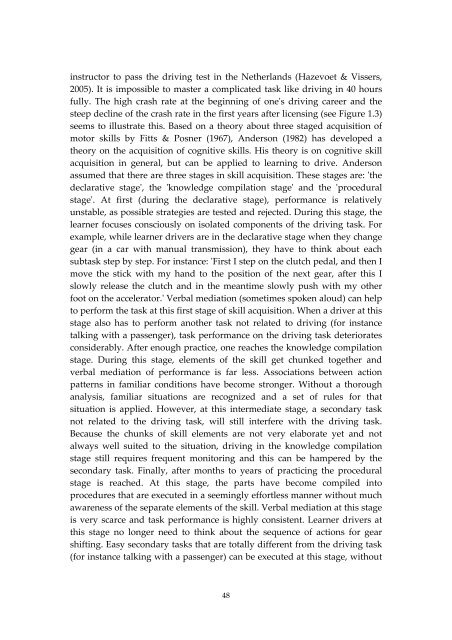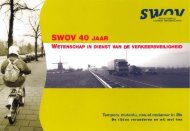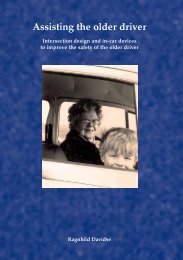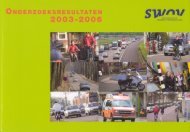Hazard anticipation of young novice drivers - SWOV
Hazard anticipation of young novice drivers - SWOV
Hazard anticipation of young novice drivers - SWOV
Create successful ePaper yourself
Turn your PDF publications into a flip-book with our unique Google optimized e-Paper software.
instructor to pass the driving test in the Netherlands (Hazevoet & Vissers,<br />
2005). It is impossible to master a complicated task like driving in 40 hours<br />
fully. The high crash rate at the beginning <strong>of</strong> one's driving career and the<br />
steep decline <strong>of</strong> the crash rate in the first years after licensing (see Figure 1.3)<br />
seems to illustrate this. Based on a theory about three staged acquisition <strong>of</strong><br />
motor skills by Fitts & Posner (1967), Anderson (1982) has developed a<br />
theory on the acquisition <strong>of</strong> cognitive skills. His theory is on cognitive skill<br />
acquisition in general, but can be applied to learning to drive. Anderson<br />
assumed that there are three stages in skill acquisition. These stages are: 'the<br />
declarative stage', the 'knowledge compilation stage' and the 'procedural<br />
stage'. At first (during the declarative stage), performance is relatively<br />
unstable, as possible strategies are tested and rejected. During this stage, the<br />
learner focuses consciously on isolated components <strong>of</strong> the driving task. For<br />
example, while learner <strong>drivers</strong> are in the declarative stage when they change<br />
gear (in a car with manual transmission), they have to think about each<br />
subtask step by step. For instance: 'First I step on the clutch pedal, and then I<br />
move the stick with my hand to the position <strong>of</strong> the next gear, after this I<br />
slowly release the clutch and in the meantime slowly push with my other<br />
foot on the accelerator.' Verbal mediation (sometimes spoken aloud) can help<br />
to perform the task at this first stage <strong>of</strong> skill acquisition. When a driver at this<br />
stage also has to perform another task not related to driving (for instance<br />
talking with a passenger), task performance on the driving task deteriorates<br />
considerably. After enough practice, one reaches the knowledge compilation<br />
stage. During this stage, elements <strong>of</strong> the skill get chunked together and<br />
verbal mediation <strong>of</strong> performance is far less. Associations between action<br />
patterns in familiar conditions have become stronger. Without a thorough<br />
analysis, familiar situations are recognized and a set <strong>of</strong> rules for that<br />
situation is applied. However, at this intermediate stage, a secondary task<br />
not related to the driving task, will still interfere with the driving task.<br />
Because the chunks <strong>of</strong> skill elements are not very elaborate yet and not<br />
always well suited to the situation, driving in the knowledge compilation<br />
stage still requires frequent monitoring and this can be hampered by the<br />
secondary task. Finally, after months to years <strong>of</strong> practicing the procedural<br />
stage is reached. At this stage, the parts have become compiled into<br />
procedures that are executed in a seemingly effortless manner without much<br />
awareness <strong>of</strong> the separate elements <strong>of</strong> the skill. Verbal mediation at this stage<br />
is very scarce and task performance is highly consistent. Learner <strong>drivers</strong> at<br />
this stage no longer need to think about the sequence <strong>of</strong> actions for gear<br />
shifting. Easy secondary tasks that are totally different from the driving task<br />
(for instance talking with a passenger) can be executed at this stage, without<br />
48
















